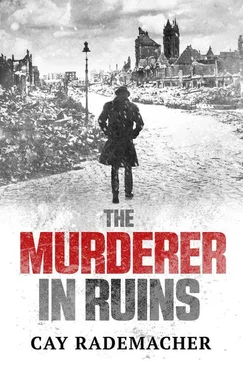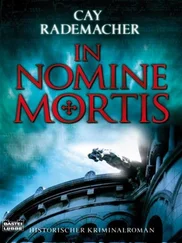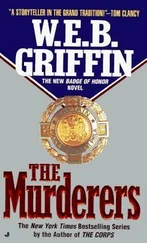Cay Rademacher - The Murderer in Ruins
Здесь есть возможность читать онлайн «Cay Rademacher - The Murderer in Ruins» весь текст электронной книги совершенно бесплатно (целиком полную версию без сокращений). В некоторых случаях можно слушать аудио, скачать через торрент в формате fb2 и присутствует краткое содержание. Год выпуска: 2015, ISBN: 2015, Издательство: Arcadia Books Limited, Жанр: Триллер, на английском языке. Описание произведения, (предисловие) а так же отзывы посетителей доступны на портале библиотеки ЛибКат.
- Название:The Murderer in Ruins
- Автор:
- Издательство:Arcadia Books Limited
- Жанр:
- Год:2015
- ISBN:9781910050750
- Рейтинг книги:5 / 5. Голосов: 1
-
Избранное:Добавить в избранное
- Отзывы:
-
Ваша оценка:
- 100
- 1
- 2
- 3
- 4
- 5
The Murderer in Ruins: краткое содержание, описание и аннотация
Предлагаем к чтению аннотацию, описание, краткое содержание или предисловие (зависит от того, что написал сам автор книги «The Murderer in Ruins»). Если вы не нашли необходимую информацию о книге — напишите в комментариях, мы постараемся отыскать её.
The Murderer in Ruins — читать онлайн бесплатно полную книгу (весь текст) целиком
Ниже представлен текст книги, разбитый по страницам. Система сохранения места последней прочитанной страницы, позволяет с удобством читать онлайн бесплатно книгу «The Murderer in Ruins», без необходимости каждый раз заново искать на чём Вы остановились. Поставьте закладку, и сможете в любой момент перейти на страницу, на которой закончили чтение.
Интервал:
Закладка:
‘Maybe there are lots of Johann Schwarzhubers out there,’ the chief inspector argued, ‘but not everybody in Hamburg is a Johann Schwarzhuber. If you were not to return from our walk tonight, he might not report you missing, but somebody else would.’
Anna von Veckinhausen looked long and hard at him, then shook her head with a weary smile. ‘You’re wrong,’ she murmured, letting her voice fade away and staring at the ice on the river.
‘Then it must be pure good luck that you at least made the effort to go to the police,’ Stave said. Would nobody really miss Anna von Veckinhausen, he wondered? How sad – but deep down there was a part of him that was gladdened by the news: it meant she had no husband.
The all of a sudden something occurred to him. He took a photo out of his coat pocket, a photo of the earring that had belonged to the fourth victim. ‘You’re an expert on art and jewellery. Have you ever seen this before?’
Anna von Veckinhausen took the photo, handling it carefully as if it was a piece of art itself. ‘Rene Lalique,’ she said after studying it for a few brief seconds.
Stave stared at her. ‘Who?’
She smiled charitably. ‘A jeweller, who makes items a policeman could not afford to buy. Art nouveau. Rene Lalique was a Parisian fine jeweller. He produced pieces like this from 1870 until 1914. Does it have something to do with your murders?’
Stave took the photograph back. ‘If and when I catch this bastard, I may well owe it entirely to you.’ Then he told her the circumstances in which the earring had been found. ‘Where did this Rene Lalique sell his jewellery?’
‘Only in Paris. But this earring is virtually an antique. It may have been handed on several times before it became the property of your victim.’
‘But it could signify that the woman who wore it had been in France, possibly before the war, and that she was probably rich?’
‘Whoever it belonged to was undoubtedly rich.’
Stave’s thoughts turned to the medallions. ‘Is there any religious meaning to starfish and pearls? Connected with some cult, or anything like that?’
She looked at him, slightly puzzled for a minute or two, and then shook her head.
‘That’s a shame,’ the chief inspector said. ‘It would have been nice if you could have done the whole job for me.’
Anna von Veckinhausen smiled again. When they reached the Nissen hut she held out her hand to him. Stave shook it, holding on just a second or two more than strictly necessary.
‘Let me know if you want a painting to hang on those bare walls of your office.’
‘I’ll be in touch,’ said Stave. ‘That’s a promise.’
Lost in his thoughts, Stave wandered through the ruins, exhausted by the amount of walking he’d done, but strangely happy. I’m finally getting somewhere, he thought. And he could not help adding mentally, and I just might be beginning to get somewhere with Anna von Veckinhausen, although he didn’t dare ask himself where that ‘somewhere’ might be.
Given that he had to pass near to Marienthal on his way home – the electricity had been turned off by now so it was too late for the trams – and that this seemed to be his lucky day, he decided to stop by the Hellinger household. Maybe the industrialist had turned up again without his wife bothering to inform the police. Things like that happened. Or maybe his wife will have thought of something else that might be of interest. And apart from anything else, it was warm in her villa, and she had hot tea.
The street was lined with grand houses, each one as dark as a tomb. When he was close to the house, he had second thoughts for a moment. Then he spotted Frau Hellinger though the window, sitting at her kitchen table in tears. Stave hesitated for a minute, then knocked on the door anyway. It was a while before the door was opened. The industrialist’s wife looked pale, but if he had not caught sight of her a few minutes ago he would have had no idea that she had been sobbing her heart out. She looked at him worriedly.
She must think I have bad news, Stave realised, and smiled quickly, telling her he had nothing new to report, but was just wondering if she had thought of anything more she might want to tell the police since he was last there.
To his relief she asked him in. Into the warmth, the scent of hot coal and tea.
‘I’m not sure I have anything more I can tell you,’ she mumbled. ‘You know my husband was doing business with the English?’
Stave said nothing, just sipped at the tea she had poured him.
‘You know also that he made navigation equipment for U-boats. What more is there to tell you?’
The chief inspector had an idea. ‘Who was the last visitor your husband had before his disappearance?’
She thought for a moment. ‘The day before…? Nobody called. But two days before an English officer was here. He used to come quite regularly to the house, or to my husband’s office. They talked about technical stuff, I assumed, though I don’t really know.’
‘Do you know his name by any chance?’
‘Oh yes, a charming young man. Not very military at all. Lieutenant MacDonald. James C. MacDonald.’
Signs of Life
Tuesday, 18 February 1947
It was the cold that came to Stave’s rescue. He had tossed back and forth in his sleep, thrown the blanket off and lain there bathed in sweat on the crumpled sheet until the bitter cold chased away at the spectre of his nightmare. Fire. Bombs. Smoke. The stench of burning flesh. Margarethe’s face. Always the same scenes from the same movie – and yet every time they seemed fresh. As if Stave had seen Margarethe in the flames, had stood there next to the flames, screaming. Yet she never heard him, because her body was frozen to the floor, despite the heat of the flames. With a small red line around her neck. Staring at him with open eyes, coated in ice.
I really need to solve this case, the chief inspector told himself, otherwise it’s going to haunt the rest of my life. Once upon a time he had been able to leave his investigations at the door, the way he hung up his coat on a peg. As soon as he got home, that was it with work; he stopped thinking about it. His apartment was his little fortress of domestic happiness. Until the bombs fell.
Stave felt his way around the apartment. The ice on the windowpanes obscured the early dawn sunlight. He felt as if he was groping his way through a thick barley soup just to get to the kitchen table. The grey glow obscured his view of the wonky table and the chair with one broken leg. He reached for the back of the chair, nearly knocking the enamel coffee cup over. Not that it mattered. He didn’t have any coffee, and hot water was in as short supply as daylight,
Power cut.
Stave had forgotten that each district of the city had its power cut off for two hours a week, because there was not enough coal to fuel all of the power stations. This morning was Wandsbek’s turn. Where was his candle?
He tried to build up his courage. I can still think, even in the twilight. MacDonald. The Englishman had been leading him up the garden path, not admitting his visits to the missing industrialist. But why? Did it have something to do with the murders? Was Hellinger the next corpse they would find in some cellar? Did he finally have a concrete lead to the killer? MacDonald? It seemed absurd.
He hadn’t paid any attention to the lieutenant’s alibis. Erna Berg had said he was often missing for hours on end. What had he been doing during this time? He might be the killer. But what would the motive have been? Looting was hardly likely. The occupation officers lived like colonial lords, just think of the business Anna von Veckinhausen did selling them antiques. And in any case, Frau Hellinger hadn’t known any of the other victims – what could be the connection between those four and a missing industrialist? And how might MacDonald be involved in all of this?
Читать дальшеИнтервал:
Закладка:
Похожие книги на «The Murderer in Ruins»
Представляем Вашему вниманию похожие книги на «The Murderer in Ruins» списком для выбора. Мы отобрали схожую по названию и смыслу литературу в надежде предоставить читателям больше вариантов отыскать новые, интересные, ещё непрочитанные произведения.
Обсуждение, отзывы о книге «The Murderer in Ruins» и просто собственные мнения читателей. Оставьте ваши комментарии, напишите, что Вы думаете о произведении, его смысле или главных героях. Укажите что конкретно понравилось, а что нет, и почему Вы так считаете.











